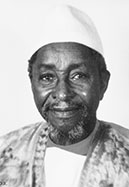 Amadou Hampâté Bâ (c. 1900-1991) was a well-known Malian
diplomat and author of the last half of the twentieth century. His fiction and non-fiction
books in French are widely respected as sources of information and insight on West
African history, religion, literature and culture, and life. Bâ devoted his
life to recording, collecting, and preserving the wisdom of sub-Saharan Africa:
the myths, sayings, anecdotes, and oral teachings of the peoples of the French “Soudan”
(present-day Mali, “Upper Volta,” and present-day Burkina Faso). He has contributed
immeasurably to preserving the heritage of the Fulani (Peul), Bambara, Dogon, Hausa,
Tukolor, and other ethnic groups whose traditions, teachings, and cultures are rapidly
being eroded by the mesmerizing intrusion of radio, television, and other mass media.
Amadou Hampâté Bâ (c. 1900-1991) was a well-known Malian
diplomat and author of the last half of the twentieth century. His fiction and non-fiction
books in French are widely respected as sources of information and insight on West
African history, religion, literature and culture, and life. Bâ devoted his
life to recording, collecting, and preserving the wisdom of sub-Saharan Africa:
the myths, sayings, anecdotes, and oral teachings of the peoples of the French “Soudan”
(present-day Mali, “Upper Volta,” and present-day Burkina Faso). He has contributed
immeasurably to preserving the heritage of the Fulani (Peul), Bambara, Dogon, Hausa,
Tukolor, and other ethnic groups whose traditions, teachings, and cultures are rapidly
being eroded by the mesmerizing intrusion of radio, television, and other mass media.
Bâ was born into the last generation of West Africans who lived in a purely traditional
African cultural setting. During his lifetime, the Western values and mindset being
imposed by the French colonizers were still largely being kept at bay in most regions,
but were rapidly and insidiously penetrating and influencing the mindset of the
growing number of young Africans who were being educated in French schools.
From the time of his youth, Mr. Bâ was a student and disciple of an extraordinary
Malian Sufi master, Tierno Bokar. Shaykh Bokar has become known as "the sage
of Bandiagara," the town in Mali where he lived for most of his life. Tierno
Bokar was remarkable for his universalist attitudes and tolerance towards orthodox
religions, for his parables and aphorisms, for his teaching methods, for the trials
of his difficult life, and, finally, for the love and light that seemed to emanate
from his person. All of this is known to us thanks to Amadou Hampâté Bâ's testimonial
to his teacher, Vie et enseignement de Tierno Bokar: Le sage de Bandiagara,
which has finally been translated into English and published by World Wisdom as A
Spirit of Tolerance: The Inspiring Life of Tierno Bokar.
Amadou Hampâté Bâ was born to an aristocratic Fula family in Bandiagara, the largest
city in Dogon territory and the ancient capital of the Masina Empire. After his
father's death, he was adopted by his mother's second husband, Tidjani Amadou Ali
Thiam of the Tukolor ethnic group. He first met his spiritual leader, Tierno Bokar,
while attending the Qur'anic school run by Bokar.
In 1942, he was appointed to the Institut Français d’Afrique Noire (IFAN, French
Institute of Black Africa) in Dakar. At IFAN, he made ethnological surveys and collected
traditions. For 15 years he devoted himself to research, which would later lead
to the publication of his work L'Empire peul de Macina (The Peul
Empire of Masina). With Mali's independence in 1960, Bâ founded the Institute
of Human Sciences in Bamako, and represented his country at the UNESCO general conferences.
In 1962, he was elected to UNESCO's executive council, and in 1966 he helped establish
a unified system for the transcription of African languages.
His term in the executive council ended in 1970, and he devoted the remaining years
of his life to research and writing. Of his books that have been translated into
English, the best known is probably his novel, The Fortunes of Wangrin.